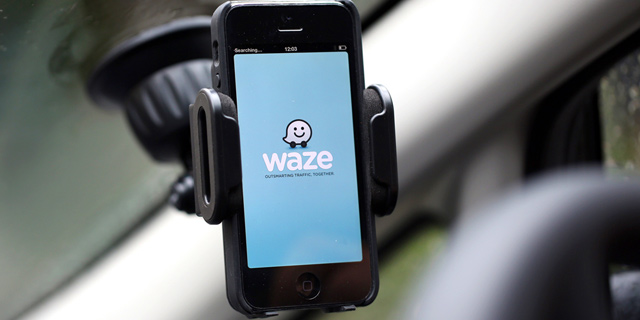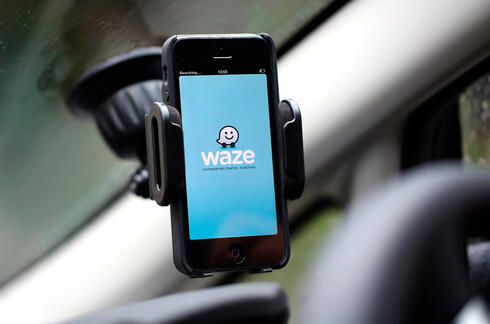
Analysis
You have reached your destination: Google elegantly says goodbye to Waze
The technology giant purchased the Israeli navigation app in 2013 to serve as an incubator for innovation and ideas. But Google never invested in the promotion of the app, preferring to attract users to Google Maps, and now, after being folded into the Geo group, it is living on borrowed time
In some ways, Waze has always been something of a stepchild within Google. A separate unit among the services and applications of the technology giant, both structurally and in branding. Since Google completed its acquisition of the navigation app in 2013, in a deal worth $1.3 billion, Waze has maintained some independence from Google, particularly its Geo division, and has operated as a separate unit. The application itself also provided a different experience: it did not speak Google's design language and did not highlight the connection to Google in any way - separate worlds.
But not anymore. The expected structural change, in which Waze’s team will be folded into Google's Geo (which includes Google Maps, Google Earth and Street View) basically marks the end of the independence of the Israeli application. It is possible that it also paves the way for its elimination. According to a report by the Wall Street Journal, 500 Waze employees will be integrated into the Geo division in what is defined as a move to streamline and reduce costs, which will be implemented on Friday. No cuts are expected at Waze, except for the departure of CEO Neha Parikh after a transition period. And at least for now, Waze will continue to operate under a separate application and brand. "Google remains deeply committed to Waze's unique brand, its beloved app and its thriving community of volunteers and users," the company said in a statement.
On Google's scale, Waze was never a huge service. According to the latest figures, in 2019 one billion people used Google Maps every month. Waze, at that time, settled for 130 million users (today the company has 151 million users). Despite a loyal user base and despite the connection to one of the most powerful technology companies in the world, Waze never managed to break through in a really big way and become a huge mass service. 130 million is nothing to be sneeze at, it is a very impressive success, but not on the scale that Google could have taken the company to.
And not by chance. About two years ago, after leaving Google, Waze CEO Noam Bardin opened a can of worms in a famous post that analyzed Google's problematic attitude towards Waze and innovation in general. Google, instead of seeing Waze as a brand to be nurtured and promoted, treated it as an incubator of ideas that should be exploited. "Every idea we had was quickly adopted by Google Maps," he wrote. Nor did the company use its vast resources to attract new users to Waze: "The Android app store treated us as a third-party application. There were no pre-installations on devices and no further distribution. We had a much larger marketing budget, but we were limited in what we could do and the third parties we could work with because of corporate policy. All of Waze’s post-acquisition growth came from work we did, not from mothership support. Looking back, we could probably grow much faster and much more efficiently if we had remained independent."
From Google's point of view, it has a strong and popular brand of maps, and has no reason to dilute it with a secondary brand that does not offer such a different and unique user experience. Google didn't want Waze to build a new map platform, but it liked the creativity and innovation of the Israeli team and wanted to integrate their future and existing ideas into the main product. And that's exactly what it did. Google kept Waze independent and as a separate brand to preserve the spirit of innovation of the team behind it and because there was really no reason to kill it, but there was also no reason to promote it.
This status quo may have continued if not for some upheavals. First, Bardin's door-slamming departure in early 2021 did not bode well for Waze’s standing at Google. Bardin was the most prominent figure in the company for years, in some ways even more so than the founders themselves. He is the one who led the sale deal to Google, who guaranteed its independence as part of the deal, and headed it while jealously guarding this independence. When he left, Waze lost its biggest and strongest protector.
Instead of Bardin, Google chose to appoint Parikh as CEO of Waze, who in her previous position served as the president of Hotwire from the Expedia group. Two things stand out in the appointment of Parikh, who herself was an extremely talented manager in her own right. First, she came from the outside, without knowing the corporate culture of Waze or Google, and without having an embedded commitment to preserving the company's independence as perhaps a CEO who was appointed from within the organization had. Second, she had no significant experience in the world of navigation and maps - she came from the world of tourism - a fact that weakened her position within Google. This was a definite step to weaken Waze’s independence.
Related articles:
The current move is the most significant so far: Parikh is leaving and instead of having its own CEO, Waze will report directly to the Google executive who heads the Geo division, Christopher Phillips. It is no longer an independent division, but another product alongside Google Maps, Google Earth and Google Street View. If the latter two are less familiar to you, it's not by chance, but because more than they are independent products, they are a feature within Google Maps (Google Earth does have a separate interface, but the main use of the product is the ability of Google Maps' satellite photos, Street View doesn't even have its own interface outside of Google Maps). The organizational change indicates that this is also the direction in which the company hopes to pull Waze.
Not right away, not tomorrow, not even this year. Waze is popular and beloved too. You don't just destroy a successful brand like that. Do it slowly, in stages. Maybe start with the migration of successful features to the mothership, then attract some Waze teams because they know the capabilities best and need them there - and don't worry about replacing them. Later, more employees are transferred to other projects, because they are really needed there, until finally Waze works only with a minimal team, in maintenance mode only, without the ability to deal well with malfunctions, not to mention developing new features.
At the same time, they will play with the branding. To strengthen the application, of course. One day, it will no longer be Waze but Waze by Google Maps (and is it possible that Google Maps is a little bigger on the login screen, or are we just imagining it?). They will also change the visibility and the interface, which will be more similar to that of Google Maps. After all, design uniformity should be maintained in the corporation's products. It will also make it easier for users. There is no reason to maintain a separate team of designers and UI people when Google Maps already has someone doing the work. All of this dilutes the brand, undermines independence and produces a less good and less differentiated app. This is the stage where users think 'if there is no real difference between Google Maps and Waze (of Google Maps), and in fact Waze is no longer that good, it keeps crashing and getting stuck, what am I still doing there? We'll go to Google Maps and that's it'.
Then one day, in five years or so, you wake up in the morning and realize: Waze almost no longer has its own team, the app is no longer that unique or differentiated, and the users are also leaving. Why do we still need Waze? It's time to issue a press release that, due to a dramatic drop in usage, Waze is closing, the remaining employees will be dispersed among other teams, and the business is over. And the saddest thing: when that moment comes, no one will care anymore.
Google response: "Google remains deeply committed to Waze’s unique brand, its beloved app, and its thriving community of volunteers and users. Bringing the Waze team into Geo's portfolio, which includes mapping tools such as Google Maps, Google Earth and Street View, will allow the teams to benefit from expanded technical collaboration while continuing to provide users with the same experiences they know and love."
